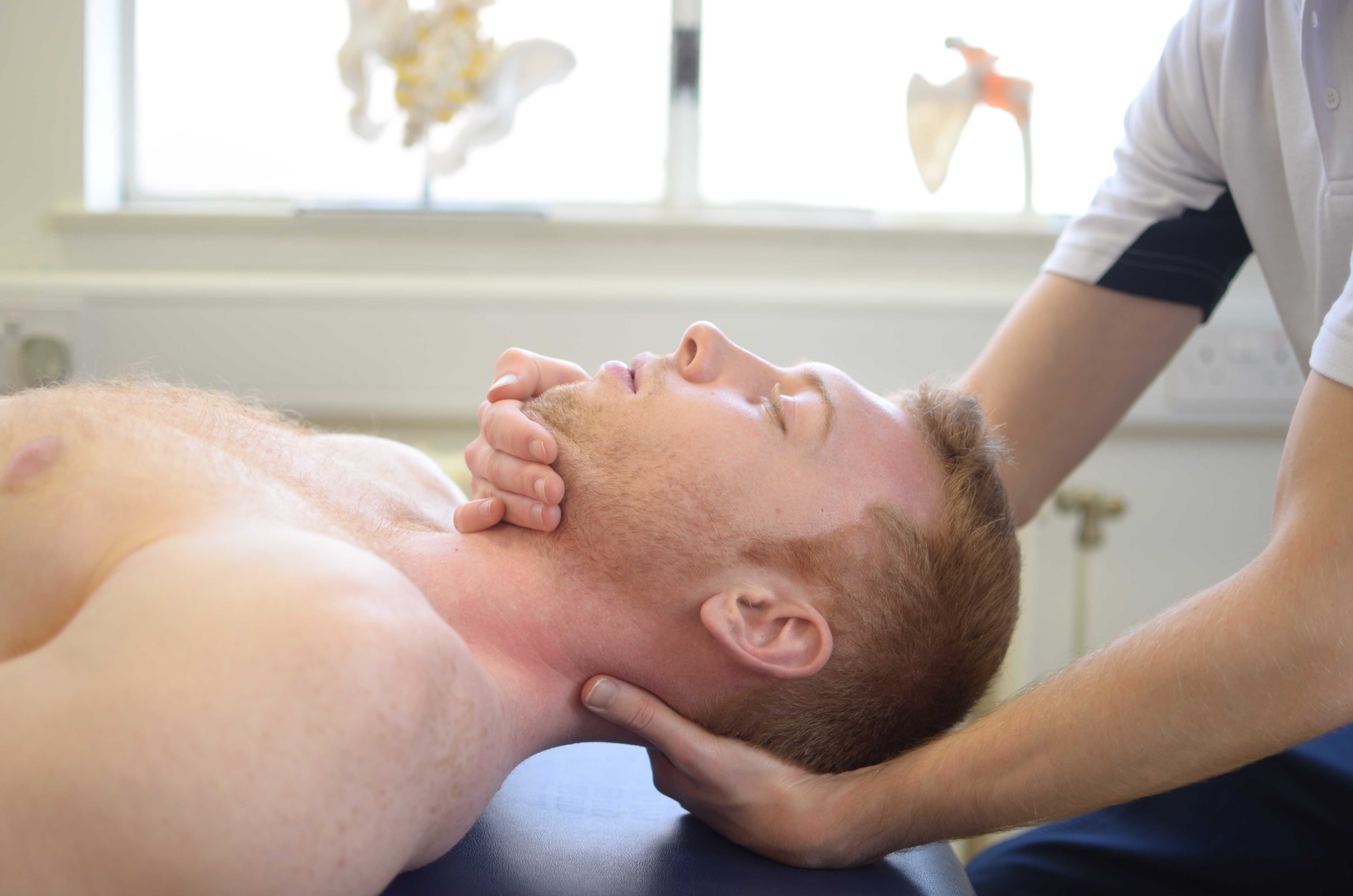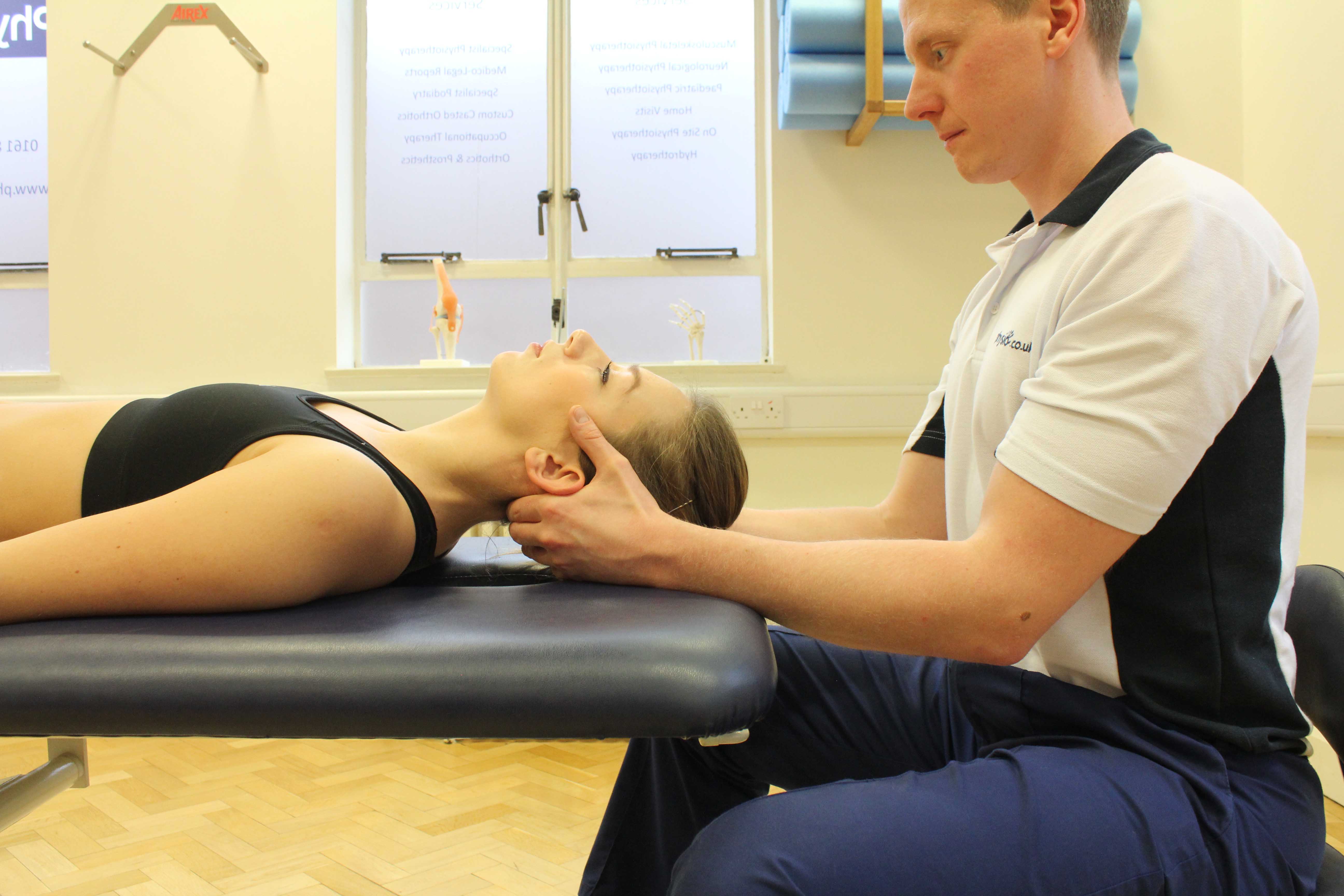What is vertigo?
Vertigo is the feeling of dizziness or a spinning sensation. It is due to a problem with the vestibular system in the inner ear which helps us maintain a steady sense of balance. There are two types of vertigo:
- Subjective vertigo: a feeling that you are moving
- Objective vertigo: a feeling that things around you are moving
 Above: Vestibular physiotherapy - passive resetting exercises
Above: Vestibular physiotherapy - passive resetting exercisesWhat causes vertigo?
There are various different causes of vertigo. It is important to establish the exact reason behind your symptoms to give the best possible outcome of your physiotherapy treatment. Your physiotherapist at Physio.co.uk will provide you with a comprehensive assessment to help determine the cause of vertigo but you may also need to have certain tests to confirm the condition. Most cases of vertigo are mild and only last for a short period of time but unfortunately this can become an on-going issue with some people.Possible causes of vertigo include:
- Labyrnthitis
- Vestibular Migraines
- A bleed in the brain
- A sudden movement change in direction
- Head injury
- Multiple sclerosis (MS)
- Benign paroxysmal positional vertigo (BPPV)
- Vestibular neuritis
- Ménière’s disease
- Acoustic Neuroma
What are the symptoms of vertigo?
There are a number of symptoms associated with vertigo other than dizzy and spinning sensations. Physio.co.uk will work with you to identify your main symptoms and tailor a physiotherapy programme to minimise these. Potential symptoms of vertigo include:
- Nausea
- Dizziness
- Headaches
- Vomiting
- Felling giddy
- Anxiety/ Panic
- Loss of hearing
- Ringing in the ears (tinnitus)
- Unsteady when standing or walking
- Loss of balance
- Weakness
- Sensitivity to light or sound
- Unintentional eye movement (nystagmus)
- Eye pain
- Fatigue
 Above: Vestibular physiotherapy - passive resetting exercises
Above: Vestibular physiotherapy - passive resetting exercisesHow is vertigo diagnosed?
There are a number of different ways of diagnosing vertigo depending on what has caused the condition. Often you will be advised to have a variety of tests to accurately confirm vertigo so that your treatment is effective as possible. Tests may include:
- Recording a full history of symptoms
- Balance tests
- Hallpike’s manoeuvre: a test that temporarily brings on symptoms of vertigo
- Hearing tests
- Eye test
- Blood tests
- CT/ MRI scans
How can physiotherapy help with vertigo?
Physiotherapy is a very effective way to help minimise the symptoms of vertigo. The physiotherapists at Physio.co.uk will provide you with a full assessment and a personalised treatment programme to meet you goals and needs. Physiotherapy can help with vertigo in the following ways:
- Provide a diagnosis and advice on symptom management
- Improve balance
- Reduce feelings of dizziness and spinning
- Reduce walking and standing difficulties
- Minimise headaches
- Reduce the episodes of vertigo
What physiotherapy will be used to treat vertigo?
The physiotherapy chosen to treat your condition will depend on the exact symptoms and severity of vertigo. Your physiotherapy at Physio.co.uk may adapt each session according to your current signs and symptoms. Physiotherapy may include:
- The Epley Manoeuvre: this is a technique aimed at moving the otoconia pieces (crystals) which are disrupting the vestibular system, to areas which will not cause any symptoms. Four specific movements are carried out to try and move the crystals.
- Vestibular rehabilitation - which includes special exercises designed to get your vestibular system functioning normally again
- Neck mobilisations
- Balance retraining
- Pacing
- Activity adaptation advice
Summary
Vertigo is unwanted sensations of dizziness and spinning. You may feel as though you are moving (subjective vertigo) or the environment around you is moving (objective vertigo). It can be caused by a number of reasons including head injury, migraines, Labyrinthitis or BPPV, all of which can be successfully treated with physiotherapy. Physio.co.uk have dedicated physiotherapists that are experienced at treating vertigo and will be able to offer you a personalised treatment programme to minimise your symptoms.
If you require more information regarding Vertigo or would like to book an appointment, please call Physio.co.uk today on 0330 088 7800. It is also possible to book an appointment online!

 0330 088 7800
0330 088 7800

































